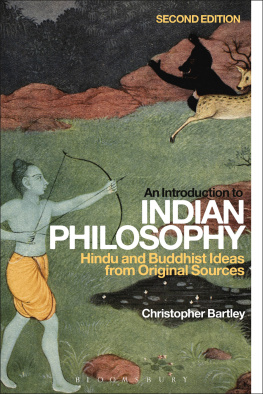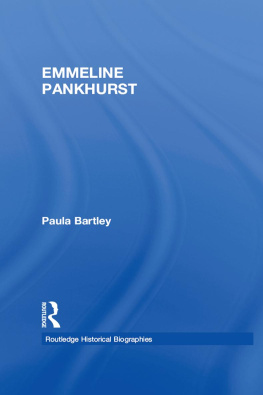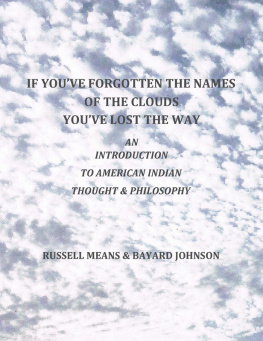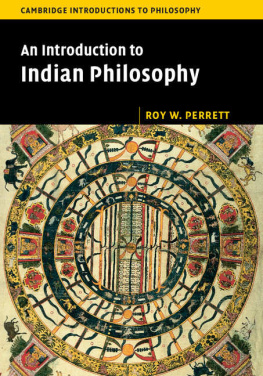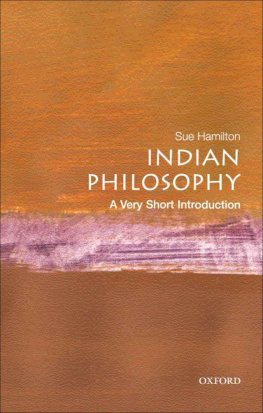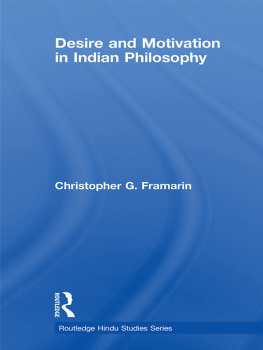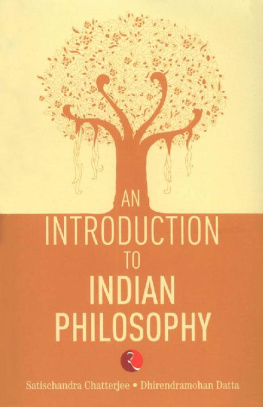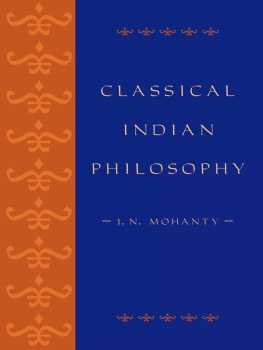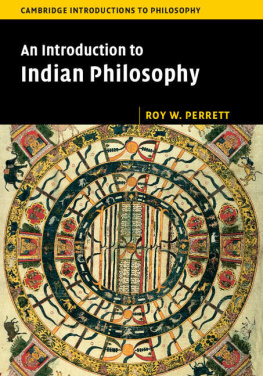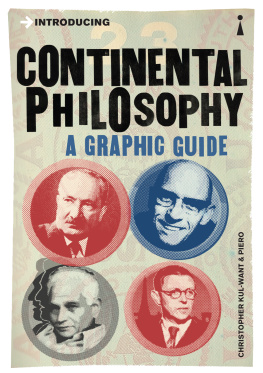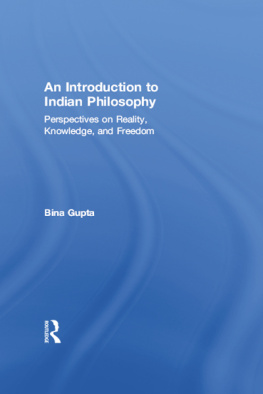Christopher Bartley - An Introduction to Indian Philosophy
Here you can read online Christopher Bartley - An Introduction to Indian Philosophy full text of the book (entire story) in english for free. Download pdf and epub, get meaning, cover and reviews about this ebook. publisher: Bloomsbury, genre: Religion. Description of the work, (preface) as well as reviews are available. Best literature library LitArk.com created for fans of good reading and offers a wide selection of genres:
Romance novel
Science fiction
Adventure
Detective
Science
History
Home and family
Prose
Art
Politics
Computer
Non-fiction
Religion
Business
Children
Humor
Choose a favorite category and find really read worthwhile books. Enjoy immersion in the world of imagination, feel the emotions of the characters or learn something new for yourself, make an fascinating discovery.
- Book:An Introduction to Indian Philosophy
- Author:
- Publisher:Bloomsbury
- Genre:
- Rating:5 / 5
- Favourites:Add to favourites
- Your mark:
- 100
- 1
- 2
- 3
- 4
- 5
An Introduction to Indian Philosophy: summary, description and annotation
We offer to read an annotation, description, summary or preface (depends on what the author of the book "An Introduction to Indian Philosophy" wrote himself). If you haven't found the necessary information about the book — write in the comments, we will try to find it.
An Introduction to Indian Philosophy — read online for free the complete book (whole text) full work
Below is the text of the book, divided by pages. System saving the place of the last page read, allows you to conveniently read the book "An Introduction to Indian Philosophy" online for free, without having to search again every time where you left off. Put a bookmark, and you can go to the page where you finished reading at any time.
Font size:
Interval:
Bookmark:
An Introduction to Indian Philosophy
ALSO AVAILABLE FROM BLOOMSBURY
Exploring the Yogasutra: Philosophy and Translation , Daniel Raveh
The Bloomsbury Companion to Hindu Studies , edited by Jessica Frazier
The Bloomsbury Research Handbook of Indian Aesthetics and the Philosophy of Art , edited by Arindam Chakrabarti
The Bloomsbury Research Handbook of Indian Epistemology and Metaphysics , edited by Joerg Tuske
The Bloomsbury Research Handbook of Indian Philosophical Theories of Religion , edited by Pankaj Jain
The Bloomsbury Research Handbook to Indian Ethics , edited by Shyam Ranganathan
Understanding Asian Philosophy , Alexus McLeod
Doing Philosophy Comparatively , Timothy Connolly
An Introduction to Indian Philosophy
Hindu and Buddhist Ideas from Original Sources
Second edition
Christopher Bartley
Bloomsbury Academic
An imprint of Bloomsbury Publishing Plc

Bloomsbury Academic
An imprint of Bloomsbury Publishing Plc
50 Bedford Square | 1385 Broadway |
London | New York |
WC1B 3DP | NY 10018 |
UK | USA |
www.bloomsbury.com
BLOOMSBURY and the Diana logo are trademarks of Bloomsbury Publishing Plc
First published 2015
Christopher Bartley, 2015
Christopher Bartley has asserted his right under the Copyright, Designs and Patents Act, 1988, to be identified as Author of this work.
All rights reserved. No part of this publication may be reproduced or transmitted in any form or by any means, electronic or mechanical, including photocopying, recording, or any information storage or retrieval system, without prior permission in writing from the publishers.
No responsibility for loss caused to any individual or organization acting on or refraining from action as a result of the material in this publication can be accepted by Bloomsbury or the author.
British Library Cataloguing-in-Publication Data
A catalogue record for this book is available from the British Library.
ISBN: PB: 978-1-4725-2476-8
HB: 978-1-4725-3225-1
ePDF: 978-1-4725-2437-9
ePub: 978-1-4725-2851-3
Library of Congress Cataloging-in-Publication Data
A catalog record for this book is available from the Library of Congress.
Typeset by Deanta Global Publishing Services, Chennai, India
For Loretta, with love
Table of Contents
This revised and augmented edition has been prompted by a number of observations made by kindly reviewers and correspondents. Colleen Coalter at Bloomsbury suggested that I revise the book and then encouraged me to do it. Mikel Burley, of the University of Leeds, went to considerable lengths in providing dozens of typographical corrections as well as making a number of valuable recommendations. He has my admiration as well as my thanks. One suggestion that has not been adopted is that the abbreviations B.C. and A.D. should be replaced by B.C.E. and C.E. Does this arise from an aversion to Latin, or is the objection to Christian civilization? I have been told that C.E. stands for Common Era. But that notion is a fiction. There would be a justification for abandoning established usage were another calendar to be introduced, but merely changing the abbreviation while retaining the same calendrical system has always seemed to me rather odd.
The glossary of Sanskrit terms and the catalogue of schools, people and their works are new, but the tenor and ethos of the work remain broadly the same. Some of the more protracted translations have been removed and so many obscure points enubilated that the revisions are really quite profuse! The suggestions for further reading have of course been updated. It is hoped that the expanded table of contents will help readers to find their way around.
I have emphasized my view that the Buddhist philosophers denial of the soul proceeds primarily from a rejection of substance ontology. It is not too late to suggest that Buddhism may be understood not only as a reaction to the Brahminical commitment to substance, but as expressing a pattern of thinking that is quite as ancient as anything to be found in Hinduism. There is somewhat more about the Upaniads illustrating the idea that we are individualizations of a primary reality whose nature ( tman ) we share. The chapters about the Advaita and Viidvaita schools of Vednta have been largely rewritten with a view to providing a more complete picture of the origins of that tradition.
Department of Philosophy
University of Liverpool
October 2014
AKBh | Abhidharmakoabhya of Vasubandhu (, 1988). |
BG | Bhagavad Gt (, 1994). |
BSBh | Brahma-Stra-Bhya of akara (, 1904). |
Br.Up. | Bhadrayaka Upaniad (, 1998). |
Ch.Up. | Chndogya Upaniad (, 1998). |
IPK | varapratyabhijkrik of Utpaladeva (Torella, 2002). |
IPKV | varapratyabhijvimarin of Abhinavagupta (, 1986). |
MMK | Mlamadhyamakakrik of Ngrjuna (, 2013). |
MPAV | Matagapramevargama ( Vidypda ) of Rmakaha (Bhatt, 1977). |
NIPP | Narevaraparkpraka of Rmakaha. |
SBh | r Bhya of Rmnuja (, 1904). |
SK | Skhyakrik (, 1998). |
SV | lokavrttika of Kumrila. |
Veds | Vedrthasagraha of Rmnuja (van Buitenen, 1956). |
VV | Vigrahavyvartan of Ngrjuna (Bhattacharya, 1998). |
YD | Yuktidpik. |
This book attempts an overview of some of the topics, themes and arguments discussed by Brahminical Hindu and Buddhist Indian philosophers. It aims to explore a variety of different theories, rather than to evaluate them or to ask whether they are true. It begins with some general considerations about the background to the different philosophical schools and tries to explain the origins of the fundamental opposition between the essentialist substance ontologies propounded by Brahmins and the event or process ontologies formulated by the Buddhists, who deny that there are any real stable natures or identities. We can see a dialectic between two world views: one asserting the primacy of foundational Being as the source of a cosmos regulated by universals and populated by substantial entities, and the other understanding the world as a flux of ephemeral beings in a temporal process. According to the first view, states of affairs are produced by interactions between stable continuing entities, including enduring selves. According to the second one, the world is an ever-changing flow of events, and what we treat as individual entities are convenient abstractions from relational complexes. We ourselves are no less conditioned than the things in the world with which we are involved. The first outlook is that one fundamentally is in some sense a soul or substantial self, a further fact over and above ones experiences. In short, there is a difference between you and your life. This is precisely what is repudiated by the Buddhist outlook, according to which there are just life histories. There is no real me. Terms like self and person are convenient abbreviations for the ways in which embodied persons behave in the world.
I am not apologizing when I say that this book is a survey of some of the Indian traditions. The field is vast and there is so much to be explored. I have tried to describe what the traditions deem the fundamentals, and it is to be hoped that readers will be moved to consult more specialized works and read the original sources so as to form their own views. Suggestions about further reading are to be found at the end of each chapter.
Next pageFont size:
Interval:
Bookmark:
Similar books «An Introduction to Indian Philosophy»
Look at similar books to An Introduction to Indian Philosophy. We have selected literature similar in name and meaning in the hope of providing readers with more options to find new, interesting, not yet read works.
Discussion, reviews of the book An Introduction to Indian Philosophy and just readers' own opinions. Leave your comments, write what you think about the work, its meaning or the main characters. Specify what exactly you liked and what you didn't like, and why you think so.

